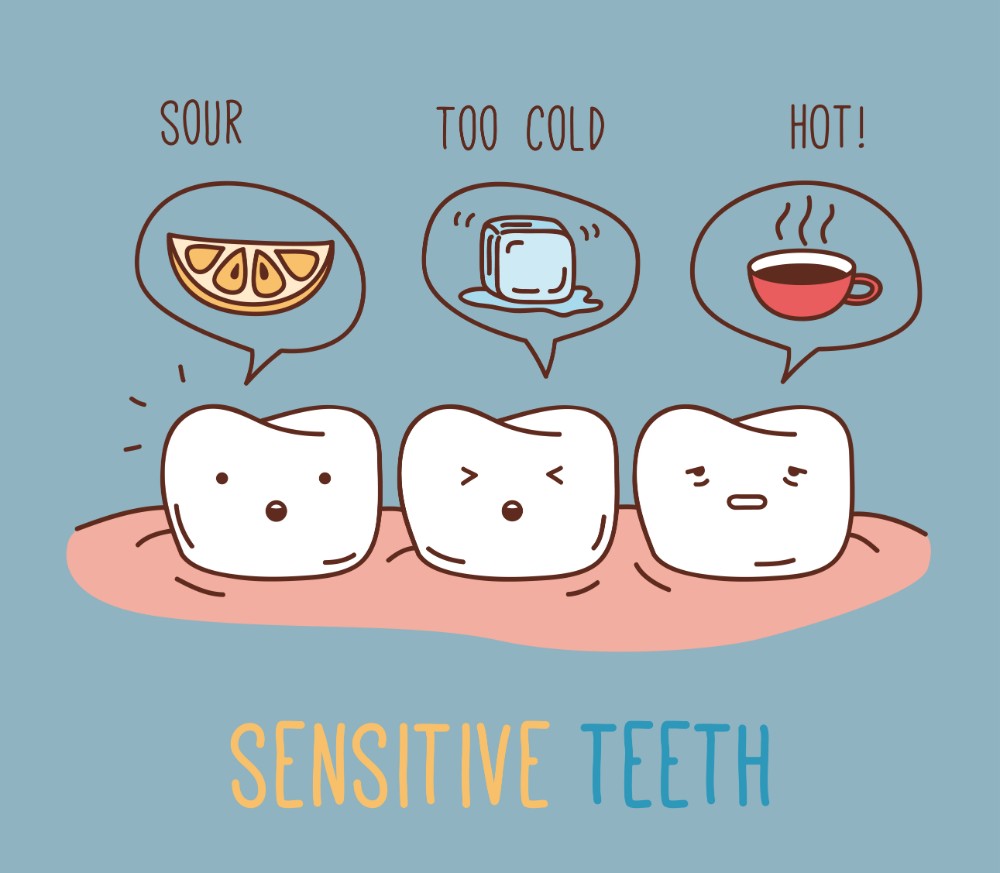Date
If you are dealing with a sensitive tooth, then you know how distracting, painful and frustrating this common dental condition can be. Here is a brief look at the typical causes of tooth sensitivity, tips for minimizing pain and how to determine if it’s time to visit your dentist.
Common Causes of Sensitive Teeth
Tooth sensitivity often occurs because of uncovered dentin — the layer of the tooth just beneath the enamel that is closest to sensitive dental nerves. When tooth enamel is compromised, the dentin is exposed, increasing the likelihood for irritated and sensitive nerves. For a lot of people, tooth sensitivity is triggered by eating cold or hot foods and drinks, breathing in cold air, or cleaning their teeth.
There are many reasons for tooth sensitivity, so it is important to understand what is instigating your pain. Sources of teeth sensitivity may include the following:
- Tooth decay: When tooth enamel starts to decay, it exposes the sensitive, innermost layers of your tooth.
- Harsh brushing habits: Vigorous brushing wears down the enamel over time and can cause gums to recede.
- OTC teeth-whitening treatment: Ingredients in over-the-counter whitening products may weaken your enamel with continued use and lead to tooth sensitivity.
- Clenching teeth: If you habitually grind your teeth, you may notice sensitivity as the teeth lose protection provided by the enamel.
- Recent dental work: It is not uncommon to experience temporary tooth sensitivity following a dental procedure, as it may cause the inner tissue of your tooth to become swollen or irritated.
- Fractured tooth: If your tooth is chipped or cracked, it exposes the sensitive inner layer of your tooth that creates discomfort.
- Gum problems: When your gums recede or you develop gum disease, your teeth may become more sensitive as the vulnerable roots of teeth are uncovered.
- Eating the wrong foods: Consuming too many acidic and sugary foods or beverages — such as soda, coffee, candy and citrus fruits — can erode tooth enamel, making the dentin more vulnerable and susceptible to pain.
How to Manage Tooth Sensitivity
In most cases, you can manage tooth sensitivity at home. For starters, make sure you are gently brushing your teeth twice a day with a soft-bristled toothbrush. Practicing good oral hygiene is one of the best ways to prevent decay and strengthen enamel.
You can also use an over-the-counter desensitizing toothpaste to help alleviate discomfort. If you drink a lot of soda and carbonated beverages, consider cutting back. Highly acidic foods and drinks can soften your enamel and trigger sensitivity.
When to See Your Dentist
When at-home treatment isn’t working, or if you have experienced dental trauma and sensitivity that doesn’t go away, it is important to schedule an appointment with your dentist.
At McLean DDS, we can help alleviate your sensitivity by determining the cause of your tooth pain and making the best treatment recommendation for you. In most cases, tooth sensitivity is easy to resolve. Treatment may include desensitizing toothpaste, fluoride gel, crowns, bonding, nighttime mouthguards or a root canal.
For more ways to help reduce your tooth pain, contact our office to schedule an appointment today.


 703-734-2750
703-734-2750






